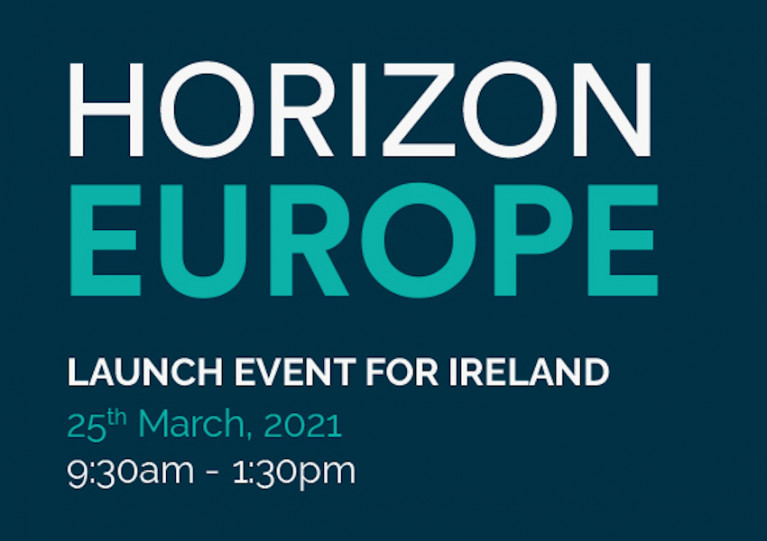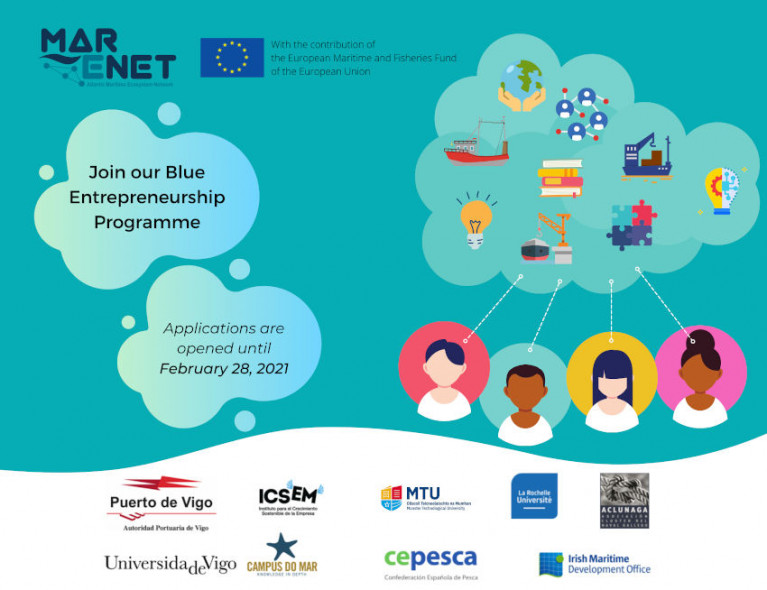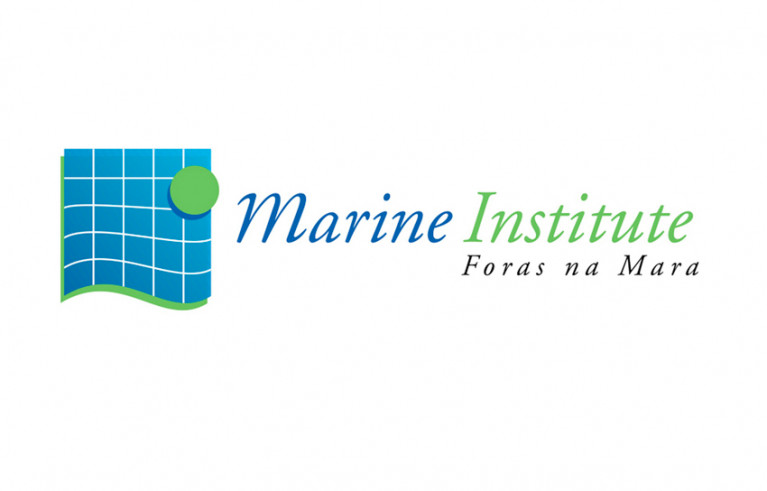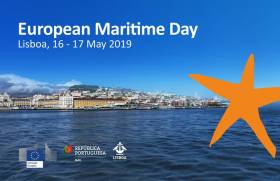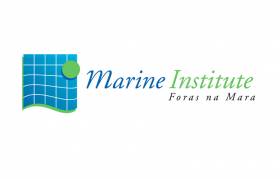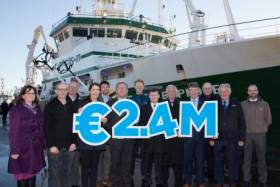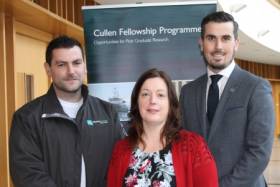Displaying items by tag: Blue Economy
Embracing connectivity is the theme of the third Pillar I workshop for the Atlantic Action Plan: ports as gateways and hubs for the blue economy.
Connectivity: Staying Connected for Trade, Tourism and Economic Growth takes place online on Thursday 16 September from 9.30am to 12.15pm IST. See the workshop agenda HERE.
The workshop will be examining the significance of connectivity in promoting trade, tourism and economic growth in the maritime transport sphere.
It will focus on the Atlantic area and highlight post-Brexit issues, digitisation, the growing importance of regional ports and regional development in general.
To take part, complete the registration form by Tuesday 14 September.
Digitisation of port operations is the topic of the first in a new series of three workshops under Pillar I of the Atlantic Action Plan: ports as gateways and hubs for the blue economy.
The Current Status and Future Direction of Digitalisation in Ports in the Atlantic Sea Basin will take place this Wednesday 12 May from 9.30am to 12.45pm GMT. See the workship agenda HERE.
Digitalisation is of key importance for the future growth, sustainability and efficiency of the maritime industry. As part of this workshop, a panel of industry experts will discuss best practices of existing projects, with a focus on the user perspective.
The workshop will also seek to address the potential of future technologies to positively impact connectivity and facilitate trade.
Irish Virtual Launch Event for Horizon Europe This Thursday
Running from 2021-2027, Horizon Europe will be the most ambitious research and innovation programme in the world with a budget of €95 billion.
Building on the achievements of Horizon 2020, Horizon Europe offers a broad range of opportunities for Irish researchers, innovators and Irish companies of all sizes in the pursuit of new discoveries, scientific and technological advancement and innovation.
The virtual event this Thursday 25 March from 9.30am will provide an overview of the Horizon Europe programme, and offer practical advice for researchers and innovators on submitting competitive applications in Horizon Europe.
This week also sees the fifth International Symposium on the Oceans in National Income Accounts, hosted online by SEMRU at NUI Galway this Wednesday 24 and Thursday 25 March.
Representatives from government, industry, academia and international organisations will share their perspectives on progress made in measuring the blue economy.
They will discuss ways in which ocean economy statistics can be improved through different accounting approaches, as well as examining how policymakers’ use of this data can be improved. For more see the agenda and registration page.
Blue Entrepreneurship Programme Aims to Foster Innovative Marine-Related Business Ideas
A new Blue Entrepreneurship Programme aims to foster innovative business ideas in the Blue Economy sector across the European Union’s Atlantic member states, including Ireland, France and Spain.
Thirty applicants with business ideas related to the marine environment will be selected by the MarENet consortium to be part of this online training and mentoring programme, which will run from March to October this year.
The programme aims to strengthen the knowledge and skills of all involved, as well as provide them with the necessary tools to pursue their ideas and turn them into projects with real potential.
Fifteen project proposals will also have the opportunity to take park in a ‘Blue Hackathon’ event in Cork this June, subject to pandemic restrictions.
This will give participants the opportunity to interact with industry, academic and research institutions, confederations and associations as well as other marine stakeholders.
At the final stage, the three winners at the Blue Hackathon will receive close assistance to identify potential funding opportunities and will be guided to create synergies with the industry to put their ideas into practice.
Speaking about the programme, Yvonne O’Byrne from Munster Technological University said: “It is a fantastic opportunity for budding entrepreneurs in the maritime sector to receive guidance and training to assist them in pursuing their business ideas.
“I think during the last 12 months, lots of us have taken some time to reflect on our careers and I’m sure there are many people out there working or interested in the maritime industry with a great idea for a new business but not sure what to do next. This programme, which is completely free of charge, is a great first step.”
If you have a business idea that responds to some of the challenges of the marine environment or maritime industry, apply today by filling out the online application form. Registration closes on Sunday 28 February 28.
To learn more about what the MarENet entrepreneurship programme includes and how you can get involved, download the brochure HERE.
The MarENet consortium, led by the University of Vigo - Campus do Mar, comprises Munster Technological University (MUT) and the Irish Maritime Development Office; Vigo Port Authority, Naval Cluster Association of Galicia (ACLUNAGA), Spanish Fisheries Confederation (CEPESCA) and Institute for Sustainable Business Growth (ICSEM) in Spain; and the University of La Rochelle in France. The MarENet project is co-financed by the European Commission’s European Maritime Fisheries Fund (EMFF).
Apply For A Stand At European Maritime Day Expo In Cork
Sunday 15 March is the deadline to apply for a stand at the European Maritime Day Expo in Cork this May.
Ahead of the official launch of registration later this month for the conference taking place at Cork City Hall on Thursday 14 and Friday 15 May, applications are now open for stands at the Expo taking place over the two days.
European Maritime Day (EMD) is the annual EU meeting point on maritime affairs and a sustainable blue economy, and targets maritime professionals, entrepreneurs and ocean leaders.
This year’s conference will also be held back-to-back with SeaFest, Ireland’s largest free family-friendly maritime festival.
As such, EMD is an ideal place for maritime stakeholders to showcase innovative ideas, products and services related to the conference themes, as well as to meet, exchange experiences and discuss the latest developments on blue economy.
Get more information from the EMD website, and apply for a stand at the EMD Expo HERE.
Ocean Energy Is Greatest Opportunity For Growth Of Blue Economy, Survey Says
Ocean energy is the greatest opportunity for the growth of Ireland’s maritime or ‘Blue’ economy, according to a new survey produced as part of the Our Ocean Wealth Summit.
As the Irish Examiner reports, the survey commissioned by the Marine Institute and PwC says more than 80% of leading voices in the maritime sector are “confident in its future growth potential”, in the words of PwC partner Declan McDonald.
Apart from offshore energy developments in wave and wind power, the survey highlights potential in maritime tourism, aquaculture, sea fisheries, biotechnology and shipping.
The Irish Examiner has much more on the story HERE.
Chief executive Dr Peter Heffernan is representing the Marine Institute at European Maritime Day 2019 in Lisbon, Portugal this week.
Concluding today, Friday 17 May, European Maritime Day is one of the largest marine science and policy meetings of the year.
The 2019 programme focuses on blue entrepreneurship, research, innovation and investment to transform traditional maritime sectors and boost emerging technologies.
Dr Heffernan said the Marine Institute “plays a crucial role in supporting, co-ordinating and promoting marine research at a national and international level.
“By working alongside academic institutions in Ireland, and participating in and leading research partnerships, the institute is able to increase our knowledge of the ocean which will assist in the sustainable management and development of our marine resource.”
The Galway Statement, signed at the Marine Institute in 2013, provided the first step in forming the Atlantic Ocean Research Alliance (AORA) between the European Union, Canada and the United States of America.
AORA aims to promote a healthier Atlantic Ocean, find more sustainable ways to use its resources and increase people’s awareness and literacy surrounding the ocean.
“AORA is science diplomacy at work,” Dr Heffernan said. “Transatlantic cooperation has been instrumental to the success of AORA and creating a strong Atlantic community.
“Within five years, scientific research teams working together in the Atlantic have unearthed new discoveries and knowledge in the areas of seabed mapping, ocean observation, climate and polar research, and marine biotechnology.”
European Maritime Day encourages a ‘blue economy revolution’ to deliver economic growth in the maritime sector and expand employment opportunity.
The programme covers almost all aspects of marine science, technology and policy, and encourages participants to engage with partners from the EU community to exchange information.
The 2020 European Maritime Day annual meeting will be hosted by Cork City Council, which will mark the first time Ireland has hosted the event.
Robotics, Internet of Things and data analytics are set to play a key role in Ireland's blue economy, according to the Marine Institute.
The national funding agency for the marine research industry recently awarded financial investments in two marine technology projects led by Xocean and IDS Monitoring.
Louth-based marine technology firm Xocean has been awarded €199,739 in funding over two years to transform marine monitoring and data collection.
The company uses innovative robotics, particularly unmanned vehicles, and IoT technology to monitor and collect data at sea.
Elsewhere, a new smart data buoy project by Clare-based IDS Monitoring will also benefit from a €196,955 funding grant, to develop a new smart buoy for coastal and inshore environmental monitoring.
The new IDS Buoy will make it easier to assemble, deploy and use buoys, as well as reducing purchase costs and maintenance, whilst enhancing the value of the information delivered through the smart buoy.
Recently announced by the Department of Agriculture, Food and Marine, the industry-led awards support Ireland's Integrated Marine Plan, Harnessing Our Ocean Wealth, as well as the national Marine Research and Innovation Strategy 2017-2021.
“Supporting Irish companies in the marine sector, through research grants, helps to accelerate innovation and drive growth in our blue economy,” said Marine Institute chief executive Dr Peter Heffernan.
“The Marine Institute is committed to assisting industry-led development through knowledge transfer, capacity building and research to enable optimal decision making and planning to best leverage our natural marine resources sustainably and efficiently.
“Both advanced technology research projects funded through the Marine Institute have the potential to be globally significant, and present enormous commercial opportunities for these Irish marine enterprises.
“Increased economic growth and job creation from small and medium sized enterprises based in Ireland is a key component of several national strategies and regional development plans.
“These awards will be carried out with the support of the Marine Institute under the Marine Research Programme 2014-2020 funded by the Irish Government, co-financed by the European Regional Development Fund.”
Minister Announces €2.4m Investment By Marine Institute In Industry-Led Marine Projects
Marine Minister Michael Creed TD has announced that the Marine Institute is to provide 12 marine businesses (in collaboration with five universities) with investment funding totaling €2.4 million over three years.
Read the full allocation of the grant recipients here
The funding is being provided to drive continued innovation in Ireland;s ocean economy, a key requirement of the Marine Institute-led National Marine Research and Innovation Strategy 2017-2021.
The 12 grants of up to €200,000 each, which are being provided to individual companies and company-led consortia, will support novel R&D and the development of new technologies in key growth areas such as marine engineering, renewable energy and the blue bioeconomy.
Minister Creed said: “Ireland’s blue economy continues to grow and develop in line with the targets of the national integrated marine plan, Harnessing Our Ocean Wealth.
“Indigenous small and medium enterprises are identifying new commercial opportunities across a range of marine sectors which can lead to economic growth and new jobs. These industry-led awards provide the opportunity for companies to build their R&D capacity and to innovate towards new products and processes.
“I look forward to seeing the 12 successful companies develop and grow their businesses with the support of this significant public investment funding.”
Marine Institute chief executive Dr Peter Heffernan added: “The Marine Institute is committed to assisting industry-led development through knowledge transfer, capacity building, research and innovation. This investment in industry-led research is a key deliverable of the Marine Institute Strategic Plan 2018-2022: Building Ocean Knowledge, Delivering Ocean Services.
“Job creation in the marine sector is increasing as a result of such investment and Irish marine companies have built an excellent reputation internationally for innovation and best practice. The 12 companies receiving funding through this funding call have demonstrated the demand and capability to fuel further growth through marine research.”
Increased economic growth and job creation from small and medium-sized enterprises based in Ireland is a key component of several national strategies and regional development plans. These awards will be carried out with the support of the Marine Institute under the Marine Research Programme 2014-2020 funded by the Government, co-financed by the European Regional Development Fund (ERDF).
A diverse range of companies applied to the Marine Institute, following the launch of its industry-led call in May 2018.
Awards have been approved for companies operating in a range of marine sectors including companies such as SolarMarine Energy (€195,465 for a floating solar hybrid energy project), Gavin & Doherty Geosolutions (€199,957 for a morphodynamic study of the Irish Sea), Subsea Micropiles (€199,902 for development of micropile technology in subsea environments), Marine Materials Ltd (€199,816 for its Eureka-SeaWind offshore wind energy project), Exceedence Ltd (€199,532 for its inline gator for aquaculture), w1Da Experience (€198,763 for its marine EcoPowa project) and Resolute Marine (€199,955 for its oscillating wave surge converter design).
Bioresources processing company Bio-marine Ingredients Ltd, was awarded €200,000 for the development of marine functional food to support healthy ageing in older adults, while advanced technologies companies Xocean Ltd (€199,739 for fisheries surveys using ‘swarms’ of unmanned vessels) and IDS Monitoring (€196,275 for its ‘smart buoy’ project), and marine engineering companies Technology from Ideas (€199,960 for the Aquamoor sustainable mooring for shellfish and seaweed) and Ocean Energy (€195,565 for engineering advanced material for marine energy and aquaculture) were also successful in their funding applications.
Importance Of ‘Blue Economy’ Skills Highlighted At Cullen Fellowship Meeting
Nineteen postgraduates presented their marine research highlighting the innovation and contributions being made towards the growth of the marine sector in Ireland at the Cullen Fellowship Programme’s two-day annual meeting last week.
Dr Peter Heffernan, chief executive of the Marine Institute which hosted the meeting in Oranmore, had particular praise for Philip Stephens of NUI Galway and James Fahy of University College Dublin, who recently completed their respective Master’s degrees in Science.
“The graduates and other Fellows’ high level of accomplishments are welcomed in Ireland, particularly when the ocean sector is one of the fastest areas of economic growth, outpacing progress in the general economy in recent years,” Dr Heffernan said.
The Cullen Fellowship Programme has provided grant aid to the value of €1.9 million supporting 24 PhD and three Master’s students in their research over the last four years.
This has involved 15 research themes identified in the National Marine Research & Innovation Strategy 2017-2021, ranging from marine technology and fisheries management to oceanographic research, aquaculture, fish health, food safety, seabed mapping, marine technology, shipping and maritime transport, marine environment, marine economics, law and policy, education and outreach.
“We are extremely pleased with the high calibre of skilled marine researchers that have been involved with the Cullen Fellowship in recent years,” said Martina Maloney of the Marine Institute’s research funding office.
“The opportunities that the students have gained has helped further support the Government’s national Harnessing Our Ocean Wealth strategy in developing a thriving maritime economy, building healthy marine ecosystems and creating engagement with the sea.”
The growth of Ireland’s ocean economy in 2017 had a direct impact of €5.5bn turnover employing over 32,000 people. The Government investment in the ocean economy is on track to double the value of Our Ocean Wealth to 2.4% of GDP by 2030.
“We are reliant on the ocean for its food through fisheries and aquaculture, ocean transport involving shipping and tourism as well as the societal impact the ocean provides us,” Dr Heffernan said.
“Therefore, with the trend in changing economies, new forms of energy, transport and food production transforming industries, companies and jobs in the near future, it is important that we continue to invest in third level research for our next generation of marine scientists and researchers.”
The Marine Institute set up the Cullen Fellowship programme in 2014 in memory of Anne Cullen (1958-2013), who had made a significant contribution to the work of the Marine Institute over 35 years, inspiring many students through the Institute's bursary programme, encouraging students to get hands-on experience to support their study.
The Cullen Fellowships are carried out with the support of the Marine Institute and funded under the Marine Research Programme by the Government.
Cullen Fellowship opportunities will be advertised as they arise on www.marine.ie under ‘Research and Funding – Current Funding Opportunities’ and through various social media channels.


























